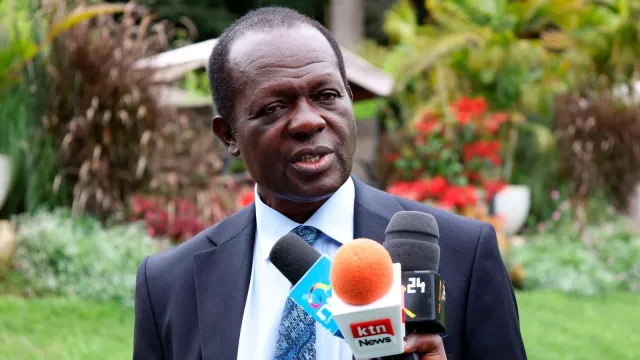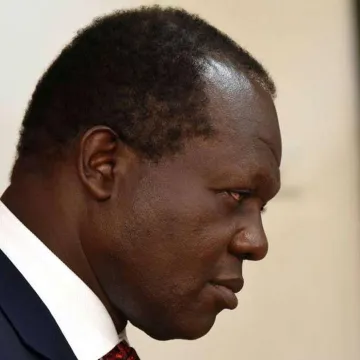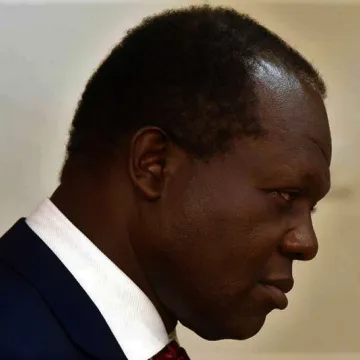Part 2: Raphael Tuju—Master of Shooting the Messenger

Former Cabinet Secretary Raphael Tuju.
In the ancient Greek tragedy Antigone, Sophocles famously observed, "For no man delights in the bearer of bad news." This timeless truth reflects humanity’s tendency to lash out at the messenger rather than confront the message itself—a reaction captured by the age-old adage, “Don't shoot the messenger.”
Raphael Tuju, however, appears to have perfected the art of doing just that in his protracted legal battle with the East African Development Bank (EADB). When rulings or judgments don’t swing his way, he doesn’t just contest the decisions; he targets the judicial officers behind them.
At the moment (see part 1), Tuju is back in a United Kingdom court in a desperate attempt to stop the EADB from auctioning his assets for defaulting on a $35 million debt—now equivalent to a whooping KES4.5 billion.
Tuju’s fightback arsenal includes orchestrating smear campaigns, demanding judges’ withdrawal from cases involving him, and filing petitions with the Judicial Service Commission (JSC), the constitutional body tasked with investigating judicial misconduct, calling for their removal from office.
It’s a strategy designed to undermine not just the rulings but also the credibility of those who deliver them. Judges resolve disputes by analysing the evidence adduced by the parties and interpreting the law applicable to the case. Given Kenya's adversarial system of justice, it is inevitable that in every dispute, there will be a winner and a loser. Often, there will always be a litigant aggrieved by any judicial outcome. The law allows a party disgruntled with a court verdict to appeal the decision.
The law also permits a party dissatisfied with a judge's conduct, for instance, bias, to make an application for their recusal (withdrawal) from the matter. This right is anchored on the cardinal tenet that justice must not only be done, but also seen to be done. But this is not to say that litigants have carte blanche to impugn the integrity of judges at whim.
Recusal is a weapon
In the case of Raphael Tuju, recusal is a weapon that can be deployed whenever the court issues a ruling against him. It does not matter that the verdict is based on evidence before the court. Since the legal dispute between him and EADB commenced in the UK courts, Tuju has persistently accused judges hearing the case of bias despite having, in the words of one Kenyan judge, "failed to provide cogent evidence to support the allegation of bias." The UK and Kenyan courts have repeatedly struck down his allegations as lacking merit. But what does the law say about recusal?
The Judicial Code of Conduct sets out grounds upon which a party may seek recusal of a judge. First is personal bias when conducting the case. Second is a close relationship with a party in the suit. Third is having financial interest in a case. Fourth is if a judicial officer has acted as an advocate for a party in the suit.
There are also numerous judgments by the superior courts elaborating the Kenyan law on recusal by a judicial officer on the grounds of bias. The common law principle that no one should be a judge in their own cause is the premise upon which the rule against bias is anchored. A judge must be and should be seen to be impartial. There is a legal presumption of judicial impartiality. A party alleging bias on the part of a judge must rebut this presumption with evidence.
Also, the courts have developed a test for judicial impartiality in cases where a judge is accused of bias. The test is whether a reasonably informed observer would reasonably entertain an apprehension that the judge would be biased in favour of one party over the other(s) in a suit. The key word is would and not might to prevent forum shopping by litigants based on frivolous claims of unfairness.
For Tuju, all this is hot air. To him, a judge is only impartial if they have determined the issues in his favour. If not, the judge is biased toward EADB. This mischievous reasoning could be brushed aside were it not for the fact that it has now become the modus operandi of a litigant, who will not accept that he is clutching on straws in his attempt to evade honouring his legal and contractual obligations to repay monies lent to him.
Justice demands that who seek its embrace come with clean hands. It is also important to note that Tuju's scurrilous attacks against judges have been most intense, even as he faces accusations of contempt of court for defying court orders appointing receiving managers to run his company under a debenture in favour of EADB.
Allegations of impropriety
Virtually every judge who touches the Tuju-EADB file sooner than later finds themselves engulfed in a dark cloud of allegations of impropriety instigated by Tuju. Take the case of Justice Grace Nzioka of the High Court. In June 2020, Tuju demanded that she withdraw from the case, accusing her of being biased towards the bank. This is after Judge Nzioka earlier in March, following an application by EADB, placed Tuju's company Dari Limited under receivership.
Never mind that Tuju and his co-litigants were, at the time, preventing the court-appointed receiver managers from accessing the Dari property. Tuju must always eat his cake and have it! To him, disobeying court orders is inconsequential but a judge allowing the bank to exercise its statutory rights to recover monies owed to it should be sanctioned by the law.
The Janus-faced Tuju on the one hand portrays the image of a victim denied justice but on the other hand refuses to obey orders issued by the same court. An ordinary observer would think that courts have in fact been too lenient on him. Ordinarily, a party that has ignored or disobeyed court orders cannot be heard by the court until they have purged their contempt.
After initially declining to recuse herself from the case, Justice Nzioka eventually withdrew, referring the case to Justice Mary Kasango, another High Court judge. But not before delivering a stinging rebuke to Tuju, accusing him of peddling "nefarious and unfounded allegations" and complaining that "at times the court has been treated with little respect."
"It is the applicants' modus operandi to attempt to delay and frustrate the course of justice and to evade payment of a debt," Justice Nzioka ruled. She went on, "The application for recusal is an abuse of the process and an attempt by the applicants to bully and intimidate the court and "forum shop or judge shop" for a judge of their own choice.
As if this was not a reprimand enough, the same script started to play out after the file was taken before Justice Kasango. Immediately after issuing orders that the debtors allow the receiver-managers to do their work, she, too, in Tuju's eyes, was 'biased" and had to go. He demanded that she withdraws. The judge declined and as expected, Tuju went on the offensive. She was adamant.
In her ruling, Justice Kasango criticised Tuju for what she saw as impunity on his part. "The 2nd to 5th plaintiffs, it would seem in this case, hold themselves as being above the law." She went as far as calling out law enforcement agencies for allowing themselves to be used by Tuju to subvert the administration of justice.
"[The] plaintiffs [are] being assisted by Kenya Police to disobey the orders of the Court… the same police who have refused to assist the Joint Receiver Manager to enforce an order of the Court… undermining not only the integrity of the court and court process but also the rule of law."
Judge transferred to different station
Even the court was aware of the power and influence Tuju wielded when he served as a powerful Cabinet Secretary in the Uhuru Kenyatta administration.
A few months after delivering her ruling, Justice Kassango was transferred to a different station, in what was described as a 'routine transfer,' but whose timing raises suspicions that it had to do with the Tuju-EADB case, specifically, her refusal to withdraw from the matter. Notwithstanding that Tuju was yet to tender an iota of evidence to support his allegations of bias against the judge.
Curiously, the Nation reported on Saturday, June 20, 2020, that "One of the judges hinted at being threatened with removal from office if she did not recuse herself."
At one point during the case, another judge of the High Court, Justice Francis Tuiyot, inexplicably withdrew from it for undisclosed 'personal reasons.' That three justices of the superior court found themselves entangled in recusal proceedings involving the same parties in the same case is a pointer to just how "bad news" from the courts makes Tuju unhappy to the extent of wanting to "kill the messenger" in this case, the judge who delivers a ruling that is unpalatable to him.
Tuju also attempted to have Justice Abigail Mshila, who had been assigned to hear the matter to disqualify herself, on the basis that she was biased against him. She, too, declined to recuse herself. Justice Mshila had dismissed a suit instituted by Tuju against senior staff of EADB claiming a staggering $30 million and ordered him to pay the costs of the suit amounting to over KES100 million.
Only Justices Maureen Odero and Alfred Mabeya, who gave favourable orders to him, have so far been spared Tuju's accusations of bias.
As recently as May 2024, Tuju was casting aspersions on judges in the highest court in the land, calling for five Supreme Court judges to be investigated over their handling of the case between him and EADB. In a complaint to the JSC, he accused the judges of 'professional misconduct' because the apex court rejected new evidence in the case.
It is not only as a debtor that Tuju has sought to intimidate courts. In August 2017, as the country braced for the heated General-Election, Tuju, Secretary-General of the then ruling Jubilee Party, launched a missive against the courts, claiming they were skewed to the opposition. He specifically wanted one judge, Justice George Odunga, to disqualify himself from a case that the opposition, NASA coalition, had filed to stop the elections. It took the then Chief Justice David Maraga to reprimand Tuju.
In 2021, Tuju, the politician, once again attacked the judiciary by alleging that it was biased against the government in what was then known as the Building Bridges Initiative (BBI) cases. The High Court had just nullified the BBI process championed by President Kenyatta when Tuju, in a television interview, warned judges that "they need police security while going home after making rulings." These remarks were widely interpreted as a thinly veiled threat to judges, who might want to rule against the regime.
Stay tuned for part 3 on Wednesday, December 11th, 2024, of this captivating story. You can read part 1 here.





